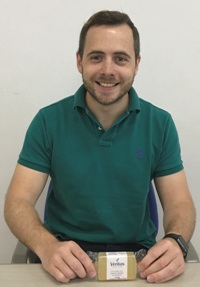“We can expand our business and offer our premium glycerin soaps all over Japan and Latin America” --Interview with a plant manager of a company manufacturing cosmetics and personal care products in Argentina—
2017/12/8(Fri)10:00
(Argentina/アルゼンチン)
La Farmaco Argentina
Mr. Andres Martin Funes (Plant Manager)
Argentina
Many business people from abroad including the emerging countries have participated in AOTS training programs. Positions of the targeted audience vary with the programs, and there are some programs aimed for top executives.
We conducted an interview with a plant manager of a company manufacturing cosmetics and personal care products in Argentina.

Looking for a partner in Japan
Maintaining our brand name
Premium glycerin soap and talcum powder
Nowadays we offer products of niche markets, such as glycerin soaps and talcum powder. Our main challenges are gaining mass consumption and participating in a new market in Latin America. The glycerin soaps we are manufacturing are recommended by a dermatologist, since they are hypoallergenic and have a well-balanced PH. They are vegetable and mineral based and chemical-free. Their translucency ensures their purity. I use them every day at home. They can be used for both body and face. Our talcum powder is also premium quality which is exclusively imported from Brazil whereas most talcum powder currently sold is Argentinian, which has a grey color. Our talcum powder has a very white color.
In order to compete with big players in the market, we have to bring down the costs. More than fifty percent of the price of our products is due to high-priced raw materials. As I mentioned before, our product quality is non-negotiable. In order to achieve high recognition for our products from overseas, we are making efforts to focus on R&D, marketing, distribution and conversion cost. We have been already working on it for complete rebranding in the short term. We’re also in search of ways to improve the current costs to compete with market prices, without abandoning our main policy.
You should try our soap.
-What are your business prospects inside and outside the country?
In 1999, Alberto Culver International bought La Fármaco Argentina, and our products were exported to all the countries in Latin America. In 2010, our company was acquired by Unilever, and our exports decreased, since we still supply products to Unilever. Last year our company was sold to a national company named Santiago Saenz. Nowadays we are regaining our national distribution and beginning to consider expanding our business into new markets.
We produce high quality products and sell them at a convenient price, so we’re confident that we can be a strategic partner in foreign markets. Our owner, Santiago Saenz, works with Sumitomo Corporation, provider of some of our active ingredients. While producing the regional products, we are also interested in developing new overseas products to develop a new market.
I’ve been to Japan several times, but never seen the same kind of soaps as our products. For example, I saw many different brands of liquid soap, but not any glycerin soaps. You should try them. I hope we can find a business partner in Japan. We are sure that we can expand our business and offer our products all over Japan and Latin America. Our main challenge is to lower the distribution cost, and we have been finding a way to do this. As I mentioned, conversion and distribution costs are something that we have to reconsider. By improving them, we would generate the necessary capital to make our brand well known abroad.
Work culture in Argentina
High and middle management positions have significantly higher rotation compared to them in Japan, where it is customary to work in one company for a lifetime as a fundamental value. In an inflationary environment such as ours, factory employees are not dedicated to one company, its values, or its retention. They try to ensure salary in the short term, having more than one job. Motivating them and ensuring quality and production standards have become unprecedented challenges for us.
Our major challenge is retaining our talented workers. Companies such as multinational companies keep searching for specialists by offering better salaries and more benefits. This makes it more difficult for a domestic company like us to keep specialists within their team or to set up a long term project.
In addition, we have the following policies for improving our human resources:
Employees set yearly targets and goals for the skills they should improve. Company products are delivered to the staff as a gift on a monthly basis. We offer prepaid medical care, canteen and cafeteria service, flexible working hours, incentives, annual bonus based on both personal efforts and company results, and annual training program, etc. In Argentina, the salary increases every year by 1% for staying in the same company.
One thing I always reckon is that true change can be achieved by everyone’s participation. You can witness how your work directly influences the organization. This does not happen in a big company.
![The Association for Overseas Technical Cooperation and Sustainable Partnerships [AOTS]](/application/files/7615/7242/3141/logo-en.png)